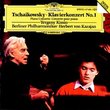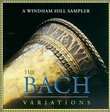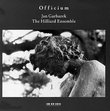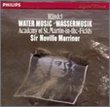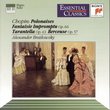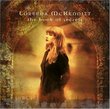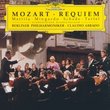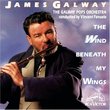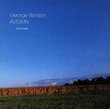| All Artists: Johann Sebastian Bach, Martin Pearlman, Boston Baroque, Nicole Heaston, Theodora Hanslowe, Ellen Rabiner, Mark Tucker, Nathan Berg Title: Bach - Mass in b minor / Heaston · Hanslowe · Rabiner · M. Tucker · N. Berg · Boston Baroque · Pearlman Members Wishing: 0 Total Copies: 0 Label: Telarc Release Date: 2/22/2000 Genre: Classical Styles: Opera & Classical Vocal, Historical Periods, Baroque (c.1600-1750) Number of Discs: 2 SwapaCD Credits: 2 UPC: 089408051722 |
Search - Johann Sebastian Bach, Martin Pearlman, Boston Baroque :: Bach - Mass in b minor / Heaston · Hanslowe · Rabiner · M. Tucker · N. Berg · Boston Baroque · Pearlman
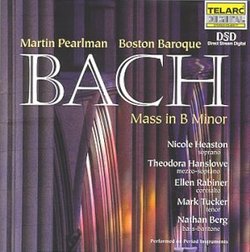 | Johann Sebastian Bach, Martin Pearlman, Boston Baroque Bach - Mass in b minor / Heaston · Hanslowe · Rabiner · M. Tucker · N. Berg · Boston Baroque · Pearlman Genre: Classical
Right out of the box, this must be considered one of the finer accounts of the B minor Mass currently available on disc, and at Telarc's two-for-one pricing, it's one of the most affordable as well. Recorded in May 19... more » |
Larger Image |
CD DetailsSynopsis
Amazon.com Right out of the box, this must be considered one of the finer accounts of the B minor Mass currently available on disc, and at Telarc's two-for-one pricing, it's one of the most affordable as well. Recorded in May 1999 at Mechanics Hall in Worcester, Massachusetts, it features a well-nigh ideal complement of musicians--a chorus of 28 and an orchestra of 31--in an acoustically excellent setting, under the direction of one of America's foremost baroque specialists, Martin Pearlman. Fluent, engaging, informed, and insightful, the performance is proof that North American period-instrument playing has come of age. In fact, the playing of the Boston Baroque ensemble is the chief glory of this account. Individually and collectively an outstanding group of instrumentalists, they deliver the obbligato solos with impeccable flair across the board, while their tutti playing is agile yet substantial in sound. The Boston Baroque choristers are not quite up to the level of their colleagues; in places, their singing lacks the ultimate degree of polish and projection, though it is unfailingly animated and communicative: witness the beautiful job they do with "Et expecto resurrectionem mortuorum" and the final "Dona nobis pacem." There is much good work from the soloists as well, though a couple of them phrase their numbers rather choppily and could show more expressive finesse. Telarc's recording is spacious and atmospheric, yet dry enough to be nicely detailed. There are also good notes from conductor Pearlman, who with this release further solidifies his reputation as an interpreter of Bach. --Ted Libbey Similar CDs
Similarly Requested CDs
|
CD ReviewsREMEMBER PEOPLE, THIS IS A MASS, NOT A REQUIEM! Trevor Gillespie | 03/16/2000 (5 out of 5 stars) "It seems that popular opinion has decreed for the B minor mass to be played with utmost gravity and weight. It should ALWAYS sound "German." It should ALWAYS sound "Baroque" in the literary sense. The drama and the agony must be placed-- ALWAYS--in the foreground. Personally, I think this performance practice should not ALWAYS apply to masterworks like the Bach's B minor mass. Many of those so-called definitive versions (Jochum, Shaw, Karajan, etc.) have wearied me so to the point of distraction with their hyperintensive seriousnesses and slow, teutonic pull. This is a new age, by crackey: I believe "church music" should be presented more directly and more humanely, sporting a less arch-romantic point of view. (And let's remember, people, the Bach's B-minor mass is first and foremost a MASS, not a REQUIEM. A powerfully involved, nonliturgical mass, perhaps, but still a MASS in it's practical construction and use!)Once or twice, I've heard this work proclaimed as the "holy of holies" of Lutheran choral composition. I might give in to that concession, for perhaps it is. But couldn't someone come along and simply lighten up the textures a bit, push the tempos just a tad, and subdue the dramatic voguing associated with traditional practice? Couldn't the conductor and the ensemble allow the words, music, and structural designs of the KYRIE, the CRUCIFIXUS, the ET RESERREXIT, and the SANCTUS speak for themselves? (I think, Rifkin may have attempted a "clearer" version during the 70s, by placing one voice, instrumental or otherwise, to a part!)But at last and finally, Maestro Martin Perlman and his wonderful Boston Baroque have heard and answered my prayers for a more direct--dare I say it? almost AMERICAN-- interpretation. And I return to my CD player with fresh, interested ears. The notes themselves now seem to witness directly of God's prevenient grace unaffected by the private dramaturgy of conductors of an earlier age.Thank you, Boston Baroque. And for those of you (trads) who cry "Blasphemy, Blasphemy" to Messr Perlman's performance choices, I only have to say to you: Bad putty tat. Bad. You should be ashamed." Outstanding Performance of this Great Work Thomas H. Moody | Nobleboro, ME United States | 03/13/2000 (5 out of 5 stars) "I have been secretly hoping that Boston Baroque would record the Bach B Minor Mass for some time now. I knew that they could present this great work in a clear, precise and emotional way. I have not been disappointed. Anyone familiar with previous recordings of Martin Pearlman and Boston Baroque (i.e. Handel's Messiah, Monteverdi's Vespers) knows what Pearlman and his group are capable of. Once again they deliver. I have heard (and own) almost all of the early music performances of this gigantic work and have found true satisfaction here, where most of the others always had some weakness along the way(with the exception of the Gardiner recording). Don't hesitate to leap at this recording. Onward Boston Baroque and I hope that there is a recording of some Handel oratorio in the near future. Having heard this group live many times, I know that they have a great repertoire under their belts which is just waiting to be committed to CD. Also kudos to Telarc for pricing the two CDs for the cost of one. Making great music more affordable to the public is something more CD companies should be doing." Bach at his best Trevor Gillespie | San Jose, California United States | 03/15/2000 (5 out of 5 stars) "When I think of all the things Bach accomplished in his life in music, the one aspect that continually amazes me is his ability to write choral music. The Mass in b Minor is in fact a major work. Pearlman brings all the elements together to have an end product of sheer beauty and listening enjoyment. Telarc did something outstanding on the recording of this work. This new DSD technology is superb. In this recording, there is increased clarity, brilliance, presence, and dynamics---in short a truer sound. The Boston Baroque plays excellently (if that is a real adverb). Compare this "period instrument" recording with what you may have and see for yourself----this new release is awesome."
|

 Track Listings (12) - Disc #1
Track Listings (12) - Disc #1


